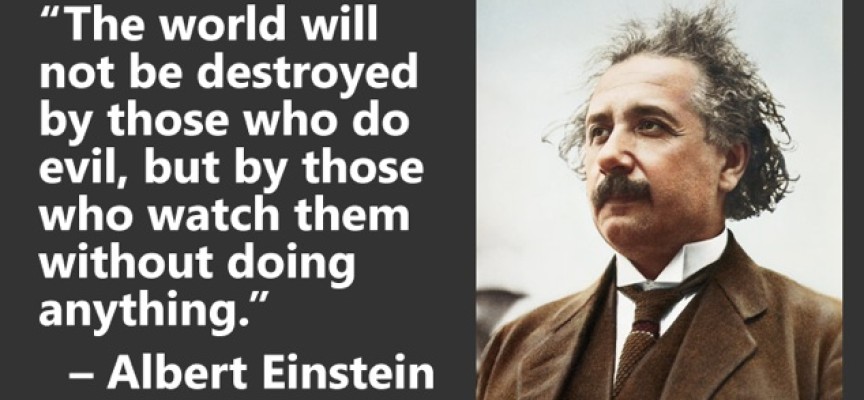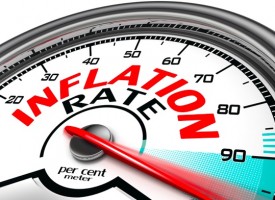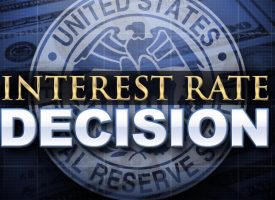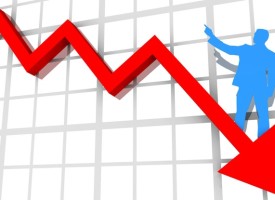With a wild start to the 2016, today a legend in the business sent King World News a powerful piece about how the terrifying endgame is unfolding in real-time.
 The Terrifying Endgame
The Terrifying Endgame
By John Ing, Maison Placements
May 19 (King World News) – Former Obama Chief of Staff, Rahm Emanuel, once said, “never let a serious crisis go to waste.” During the 2008 panic collapse, the US government bailed out big business, took over General Motors, fattened the big Wall Street banks and even nationalized mega institutions Fannie Mae and Freddie Mac. As a result, government became even bigger with an insatiable appetite for revenues and to no surprise, the economy remains in a funk. Eleven states in the US now have more people on welfare than they do employed. No wonder there is a populist backlash against Wall Street because today, the “too big to fail” institutions became not only bigger but, “too big not to fail.”
Since 1997, the six biggest banks in the US and Europe increased their assets almost five-fold. Today the banking sector is at the crux of foreign exchange trading, derivatives and overseas lending. And despite rounds and rounds of rate rigging settlements, Wall Street’s complex financial alchemy was again used to disguise their liabilities allowing big business to play an outsized role with trillions of complex structures reducing the clarity where risk lies. The upshot is that these products in Frankenstein-like fashion once turned on their creators in 2008 but today pose a bigger risk – haven’t we learned anything?…
Continue reading the John Ing piece below…
Advertisement
To hear which company investors & institutions around the globe are flocking to
that has one of the best gold & silver purchase & storage platforms
in the world click on the logo:

Americans finally joined the stealth currency war as the strong dollar fundamentals came to an end. The greenback slipped to 15 month lows on the unwinding of carry trades by foreign holders ending a two year rally. Nonetheless a currency war is a zero sum game, going back to the beggar-thy-neighbour policies of the 1930s. Seven years after the financial crisis, the Fed’s monetary expansion pumped more than $7 trillion into the financial system in an effort to stimulate lending and revive economic activity. However, instead of a pickup in growth, this cheap money created bubbles in the bond, stock and currency markets while the US national debt jumped to $19 trillion or 100 percent of GDP. Since so much money produced so few results, the Fed’s ultra-low bond policy forced investors to chase higher multiple stocks which became more expensive than ever. We believe the damaging ramifications and declining credibility of our central bankers’ policies will have a devastating impact on the global economy, raising investor risk.
 Negative Rates Brought Negative Returns
Negative Rates Brought Negative Returns
It is an upside down world. Negative interest rates delivered an outcome exactly the opposite of what they were intended to produce. Investors greeted negative rates by dumping equities. In imposing negative rates, over half of the Eurozone sovereign debt trades with negative yields. Noteworthy is that Germany and the Netherlands balked at Mr. Draghi’s latest folly, exposing divisions between the savers and the spenders. We believe negative rates are the last arrow in the central banks’ quiver of highly unorthodox methods, after quantitative easing (the printing of money to buy bonds) failed to revive a sluggish world economy.
Also running out of options, the Bank of Japan imposed a subzero policy in an attempt to cheapen its currency to lift exports. Instead the yen gained over 10 percent, offsetting any benefits from negative interest rates. Despite experimenting with rates at zero and now negative, Europe is mired in sub two percent growth, Japan is negative and the US economy only grew at a paltry 0.05 percent in the first quarter. Left unsaid is that negative rates squeezes those who borrow, with some, perversely paid to borrow, resulting in even more indebtedness. Investors are not stupid, within this environment, they will hoard cash to preserve capital. After all, why pay to stash one’s cash? A safe or mattress may provide security but not surprisingly, gold had its best quarter in 30 years.
How Low Can they Go?
Cheap money has not solved our problems, underlining the limits of central banks’ monetary policy. In none of the economies experiencing negative rates has been there been growth. Negative rates brought negative returns. Every asset class has been scrutinized with past metrics or spreads dismantled. In each country their government intermediaries, the big banks’ profits and business models weakened. Lending ironically also stopped. Reluctant to charge their depositors, major bank margins were squeezed and the old banking model was scrapped.

Financial markets also felt the repercussions of subzero rates. What ballasts the US monetary system is debt. In creating credit, the Fed purchased government securities with freshly minted dollars, bidding up bond prices allowing the Fed to push interest rates down such that it amassed a whopping $4.5 trillion of debt versus a pre-crisis average of $825 billion. All of this involves risk. According to Bloomberg, the Bank of Japan has become the world’s largest hedge fund, purchasing about 90 percent of the Nikkei 225 through ETF purchases. And not surprisingly, Fed Chair Yellen’s attempt to raise rates for the first time in over a decade, faltered as she too succumbed to the addiction of cheap money, postponing rate increases, kicking the so called rate increase down the road.
As a consequence, governments’ propensity to overspend had them confiscate private wealth through direct taxation, and when that failed, inflation and the debasement of money became the policy du jour. Various combinations of revenue enhancements, austerity and monetary policies were unsuccessfully tried to close the budgetary gaps. As a result, the politics of western economies involved scapegoating business using overregulation and overtaxation to disguise governments’ ineptitude. Inevitably, the central banks’ experimental moves encountered the laws of diminishing returns.
Governments everywhere remain reluctant to reduce spending or deal with their debt relying instead on their central banks to close the gaps through deficit financings. Moreover, politicians everywhere are too weak to solve our economic problems or unwilling to change, preferring the “sunny ways” or the “audacity of hope” type rhetoric instead of the hard truths of realpolitik. The longer our politicians dither, and leave our central banks’ unconventional alchemy to deal with our problems, the greater the damage.
Too Big Not To Fail
Wall Street, one of the beneficiaries of negative interest rates was an easy target for the nonstop populist attacks. And no wonder. Seven years after the biggest financial crisis, Wall Street has gotten bigger, our unelected central banks are in charge and we have a bigger debt problem than before. The disclosure of the Panama Papers showed that business, not only reaped but they were able to sow by setting up offshore companies and for some, even reduce their tax bite.
Indeed, in a challenge to the status quo, the popularity of Bernie Sanders and Donald Trump is such that they have captured the mainstream desire for jobs, change, less government interference and the promise to get something done. Wall Street’s greed was secondary. The Fed just allowed politicians to postpone the inevitable, mortgaging America’s future.

The problem is that governments didn’t plug the holes despite the introduction of post crisis financial reform bills like the Volcker Rule and the Dodd Frank Act that introduced layers and layers of complex regulations and refashioned the global financial markets allowing big business to become even bigger. As an example, the so called “Lender of Last” bill shifted the onus of the next bailouts to depositors and investors, reducing the risk exposure of the government, not Main Street. Despite rules to separate the investment banking or trading activities from their traditional commercial arms, in this upside down world, Goldman Sachs has been allowed to become a savings bank, taking deposits from Main Street. Instead of scapegoating Wall Street, more necessary are structural reforms on government policy and fiscal spending rather than through artificial means. And in this election year, rather than the endless ideological promises to end financial profligacy and reduce debt, concrete plans to make debt reduction a priority is needed. Unfortunately, neither presumptive nominees, Clinton nor Trump, are fiscal hawks, with Clinton a “spender” and Trump, “a serial debtor.”
To be sure, America is no longer the superpower it once was after rescuing Wall Street, fighting numerous wars and directing the Fed to revive the economy. As the largest debtor in the world, the United States even lost its financial independence when Saudi pressure threatened to dump $117 billion of US Treasuries, if Congress was to pass the Sept. 11 Bipartisan Bill, paving the way for an Obama veto. Global central banks sold $225 billion last year and so far $123 billion this year. We therefore need both presumptive nominees to promise to legislate the needed reforms and not give lip service to protect the status quo and vested interests.
Intelligentsia, You’re Fired
Investors will have to grapple with a game changing November presidential election. The idea of reality TV mogul Trump winning the presidency sounds fairly ridiculous. Then again, so did the prospect of winning the Republican nomination. Certainly, Mr. Trump’s candidacy has broken the two party system. The upcoming election will be an extreme study in contrasts. Mrs. Clinton’s strongest suit of government and foreign policy experience is Mr. Trump’s weakest. Yet Mr. Trump’s message of change and honesty is Mrs. Clinton’s weakest. At the very least, politics has changed forever and that is a good thing. The roots of political dysfunction go back to the politicization of every decision, broken promises, and of course American political campaigns became ruinously expensive and heavily dependent upon the largesse of Wall Street, super PAC groups, and special interest groups.
Though viewed with derision, there is a chance for innovation, notwithstanding the resistance from America’s political intelligentsia such as the established parties, the mainstream media and the fund-raising machines. We believe Mr. Trump may help reform a broken electoral system by exposing the fault lines within the system. He has built up a tremendous following among the disillusioned voters with establishment politicians. There is no question Mr. Trump’s views are hair-raising and undoubtedly divisive. However, these days voters are too complacent, disenfranchised and disinterested, partly because there they see little difference in a politician’s promises which is often broken, once elected. Noteworthy amid the derision is that Mr. Trump, so far, has spent about $40 million in his quest for the presidency. His frugal campaign no doubt is a record and largely because most of it was his own money. Is it possible that once elected, his stewardship of the government’s finances could be equally parsimonious? That would be innovation and change worth pursuing. Just saying!
 The Middle Kingdom Dictates the Gold Price
The Middle Kingdom Dictates the Gold Price
Of interest is that both presidential candidates are hostile towards China, in particular for alleged currency manipulation. Over the past seven years, there has been a consistent flow of gold from the West to the East. China is the world’s largest producer of gold at 460 tonnes and the largest consumer at 1,200 tonnes. However, Chinese mines are short-lived and the deficit grows larger every year. Chinese state-owned producers are also encouraged to acquire gold assets to close the deficit gap. State-owned China National Gold recently acquired Eldorado Gold’s Jinfeng Mine for $300 million and Eldorado sold its other Chinese mines to Yintai Resources for $600 million (US).
Consequently, China has become a dominant force in the physical gold market. The Chinese central bank also holds 1,808 tonnes of gold reserves up from 600 tonnes in 2009 becoming the fifth largest holder of gold in the world, ahead of Switzerland and Japan. Shanghai has become the hub for gold trade. The Shanghai Gold Exchange (SGE) the official exchange of Chinese gold, recently introduced its own benchmark “fix” denominated in renminbi for gold bullion. In the first couple of weeks of trading on the SGE, the Chinese fix closely tracked the London Gold Fix. The London Metal Exchange is owned by the HKEX. The world’s largest bank, ICBC is a participant in both fixes. The Shanghai Gold Exchange itself has some 55 vaults. With ICBC purchasing Barclay Bank’s 2,000 tonne vault in London, the bank extends its influence from sales to storage.
In the last five years, Comex warehouse inventories have been cut in half as the pool of physical gold dries up in the West. We believe China’s gold involvement is part of a major change in the global financial architecture in response to the manipulation and gaming of Western markets as well as China’s desire to diversify from the dollar because China has too many dollars. We believe the world’s largest trader also wants to make the renminbi a global reserve currency, backed by gold and not by fiat means, which can be manipulated. Who is gaming who?
 Gold’s New Bull Market
Gold’s New Bull Market
The reports of gold’s death were premature, very premature. Goldman Sachs even changed their $1,050 per ounce forecast, closing short positions. Half of the Street hates gold, one quarter is indifferent and one quarter likes gold. Everyone, however, recognizes that all is not right in the world. An old broker adage is that bull markets, “climb walls of worry.” Gold’s phenomenal rally this year broke three decade old records boosted by worries over the spread of negative interest rates, more cheap money, and a tumbling greenback. What damages trust in the US, damages the whole world. Investors are left wondering whom and what they could trust. Some sovereign wealth funds are stocking up on gold. Gold is an alternative for them. At the very least, Mr. Obama was good for the gold business.
We believe the plethora of both economic and geopolitical uncertainties such as the Middle East quagmire, European dysfunction, Greek default (again), unicorn implosions, Brexit, and now a presidential election has contributed to global market volatility. To many (including the mainstream media), gold is just a commodity. It is much more. Gold is a barometer of investor anxiety. Gold maintains its store of value, a value that cannot be weakened by the whims of either central bankers or politicians. While most investors do not fear inflation, they remain surprisingly complacent. Our view is that the resumption in gold’s bull market is a prelude to a run-up in core inflation. While the hard asset market has done well, of concern is that the bond and stock markets remain priced to perfection. Ironically if central banks get what they wish for and inflation picks up because of a lower greenback or higher commodities, that risk is not priced in the market. In an environment of negative rates and falling currencies, there is a shortage of safe havens. Gold is a beneficiary and its super rally in the first part of the year will be pale if those inflation embers flare up.
The world has been losing confidence in the currencies issued by central banks, and lately the US dollar. Investors are also aghast at the deterioration of the quality of our political leaders. Investors, like voters everywhere, feel disconnected that both our central bankers and politicians just don’t get it. One can detect the decline in confidence in every part of the world. Others like China and Russia already have more dollars than they possibly want. However, US policy has treated them more as enemies than allies or even as equals. As such it is not such a surprise that both countries are hoarding gold to offset American hegemony.
We believe they also suspect that the American people will elect an inflationary president and a dysfunctional Congress this November since neither Clinton nor Trump stand for sound money. Mr. Trump, the serial debtor, has filed for Chapter 11 bankruptcy, four times. That will be good for gold, but bad for the dollar, so we continue to expect gold at $2,200 per ounce.
***KWN has now released the extraordinary audio interview with Bill Fleckenstein and you can access it by CLICKING HERE OR ON THE IMAGE BELOW.
***Also just released: An Ominous Warning From Benjamin Franklin CLICK HERE.
© 2015 by King World News®. All Rights Reserved. This material may not be published, broadcast, rewritten, or redistributed. However, linking directly to the articles is permitted and encouraged.







